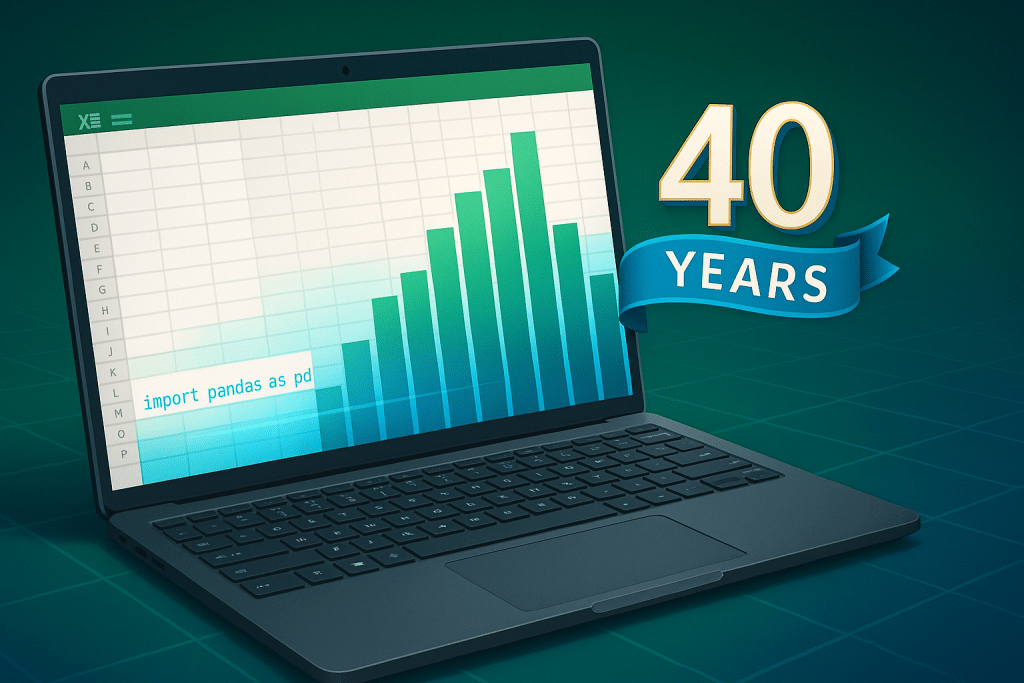Excel turns 40 this year, yet it still rules tech hiring. A 2025 analysis of 12 million U.S. job posts shows “Excel” in 531,000 listings—7× the mentions of Python and 20× those of AI skills. Why does it keep its edge? Every budget, forecast, and quick data sanity check still opens in a worksheet, and Microsoft keeps pushing the ceiling with Power Query, dynamic arrays, and now native Python. Proving you can wield those features—through the MOS Excel Expert exam or a reputable online certificate—means faster workflows and a stronger hand at the salary-negotiation table.
Why advanced Excel skills matter more than ever
Spreadsheets are still the universal ledger. A February 2025 AutoRek payments survey found that 90 percent of organizations rely on Excel or similar grids for core financial operations, even as transaction volumes surge. Learning leaders feel that pressure: 29 percent named Excel the most in-demand employee skill for 2025–27, ahead of staples like Python and AI (according to GoSkills).
Basic formulas no longer cut it. Managers expect you to cleanse data with Power Query, build spill-range dashboards with dynamic arrays, and automate tedium with macros. Microsoft raised the bar again on September 16, 2024, when Python in Excel became generally available to Microsoft 365 business users (Microsoft Tech Community). You can now run pandas code without leaving the workbook.
The payoff is real. Automating a monthly board deck can free 4 hours per cycle, and replacing a long VLOOKUP chain with XLOOKUP usually cuts error-chasing time in half (internal timing studies). That efficiency boosts your reputation: teams trust the analyst whose model never breaks.
It also boosts pay. GoSkills’ 2025 Upskilling Forecast shows that certified Excel specialists earn about 12 percent more than peers without credentials, with an even higher premium in finance and operations roles.
Bottom line: mastering Excel’s modern toolbox is the entry ticket for data-driven roles in 2025. Next you’ll choose the credential that proves you have those skills.
Certification paths at a glance
Excel credentials fall into two buckets: Microsoft’s proctored MOS Excel Expert exam or an instructor-led online course. We’ll start with the option that wins an instant nod from recruiters.
Microsoft MOS Excel Expert (Exam MO-211)
Think of the exam as a live skills demo. You’re dropped into a workbook and given 50 minutes to complete advanced tasks; there are no multiple-choice lifelines. Microsoft recommends about 150 hours of hands-on practice before test day. You need to feel at ease with nested XLOOKUPs, Power Query joins, and entry-level VBA.
Pass and you earn a digital badge that hiring teams can verify on Microsoft’s site. Any MOS certificate issued on or after September 2, 2025 expires after five years, so plan for a quick renewal to stay current.
Costs are straightforward in the United States: $104 for a single voucher or $120 for a voucher-plus-retake bundle on Certiport’s store. Many employers cover the fee because a polished workbook often saves more than the exam price within one reporting cycle.
Bottom line: if you already wrangle data daily and need a recognizable stamp of approval, MO-211 is the fastest route to credibility.
Online course certificates
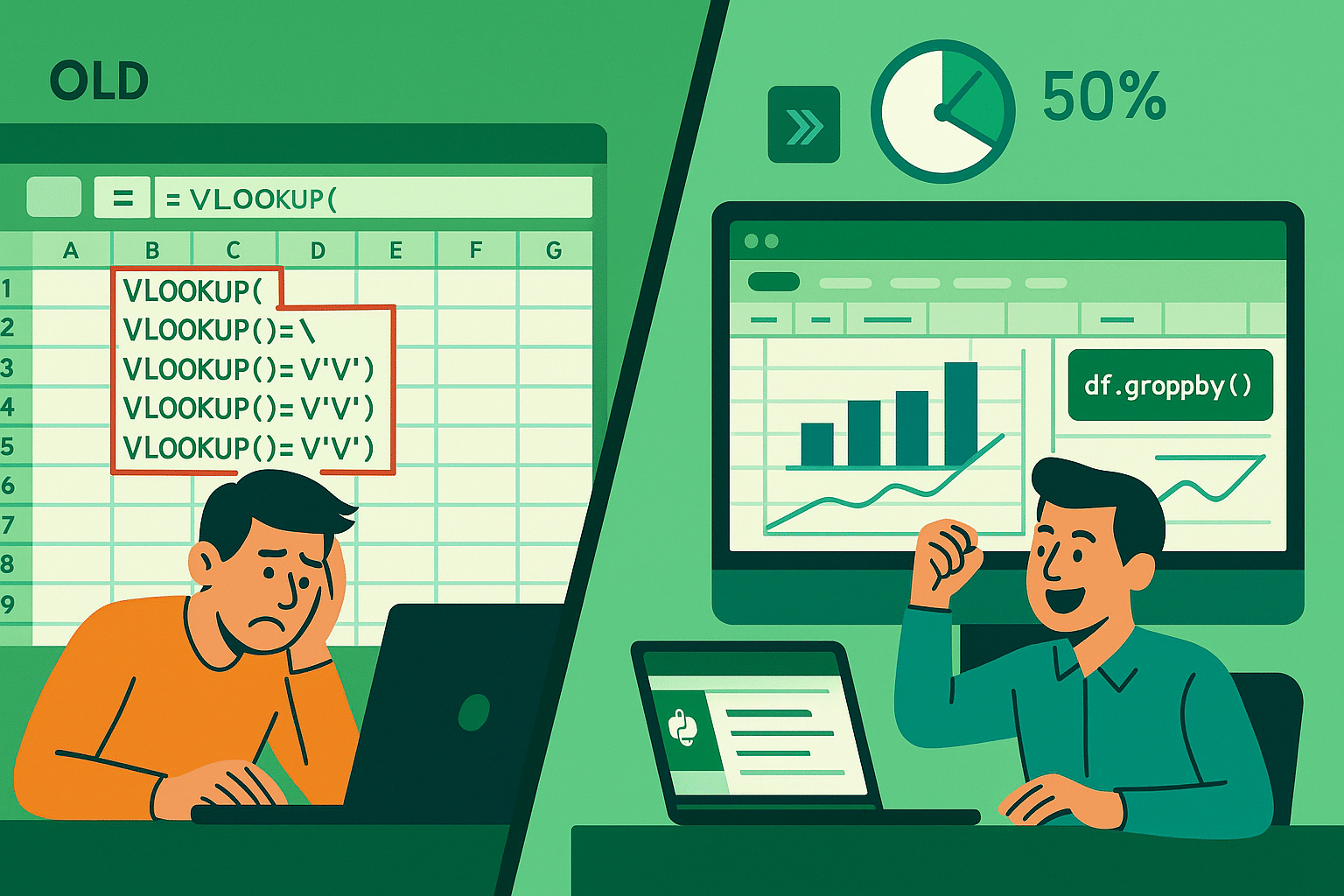
Not everyone wants the pressure of a proctored exam. Sometimes we just need guided practice, a flexible schedule, and a badge we can paste on LinkedIn the minute we finish. That is the promise of online course certificates.
GoSkills takes a microlearning tack. The platform slices Excel into five-minute micro-lessons that fit between meetings. Each clip ends with a practice file so you cement the trick before it fades. Pass the last quiz and you earn a CPD-accredited certificate. The content spans everything from VLOOKUP to beginner VBA, so you exit with a broad toolkit, not just a single party trick.
Picture a Coursera specialization run like a mini-semester. Each week you watch short videos, download real-world datasets, and submit projects that mimic workplace tasks. Finish the final capstone—a slick KPI dashboard with a few lines of VBA—and you collect a certificate stamped with Macquarie University’s logo. Hiring managers see a known university and, just as important, they see proof you built something tangible.
Udemy lives at the budget end of town. One small payment unlocks twenty-plus hours of screencasts you can binge or snack on forever. The certificate itself carries less clout than a university or Microsoft badge, but the real value is lifetime access. Treat it as an always-on reference library, the YouTube playlist you wish was ad-free and better organized.
So how do these course credentials stack up against the MOS Expert?
They shine where the exam falls short: structured learning, instructor context, and hands-on projects you can show off in an interview. They falter on universal recognition. Some recruiters will nod; others will shrug and hand you a quick skills test.
If you crave step-by-step instruction or need to fill knowledge gaps before chasing the Microsoft badge, a robust online course is often the smartest first move.
If you learn best with guided practice, or you need to fill knowledge gaps before tackling the Microsoft exam, an online certificate is often the smartest first move.
Compare the contenders at a glance
Figures current as of September 2025. We suggest checking each platform’s pricing page before you enroll, since promotions change often. An independent 2025 SaaS Adviser comparison of GoSkills, Udemy, and Coursera drills deeper into how each course stacks up on learning hours, credential recognition, and long-term ROI.
GoSkills Excel Basic & Advanced Course
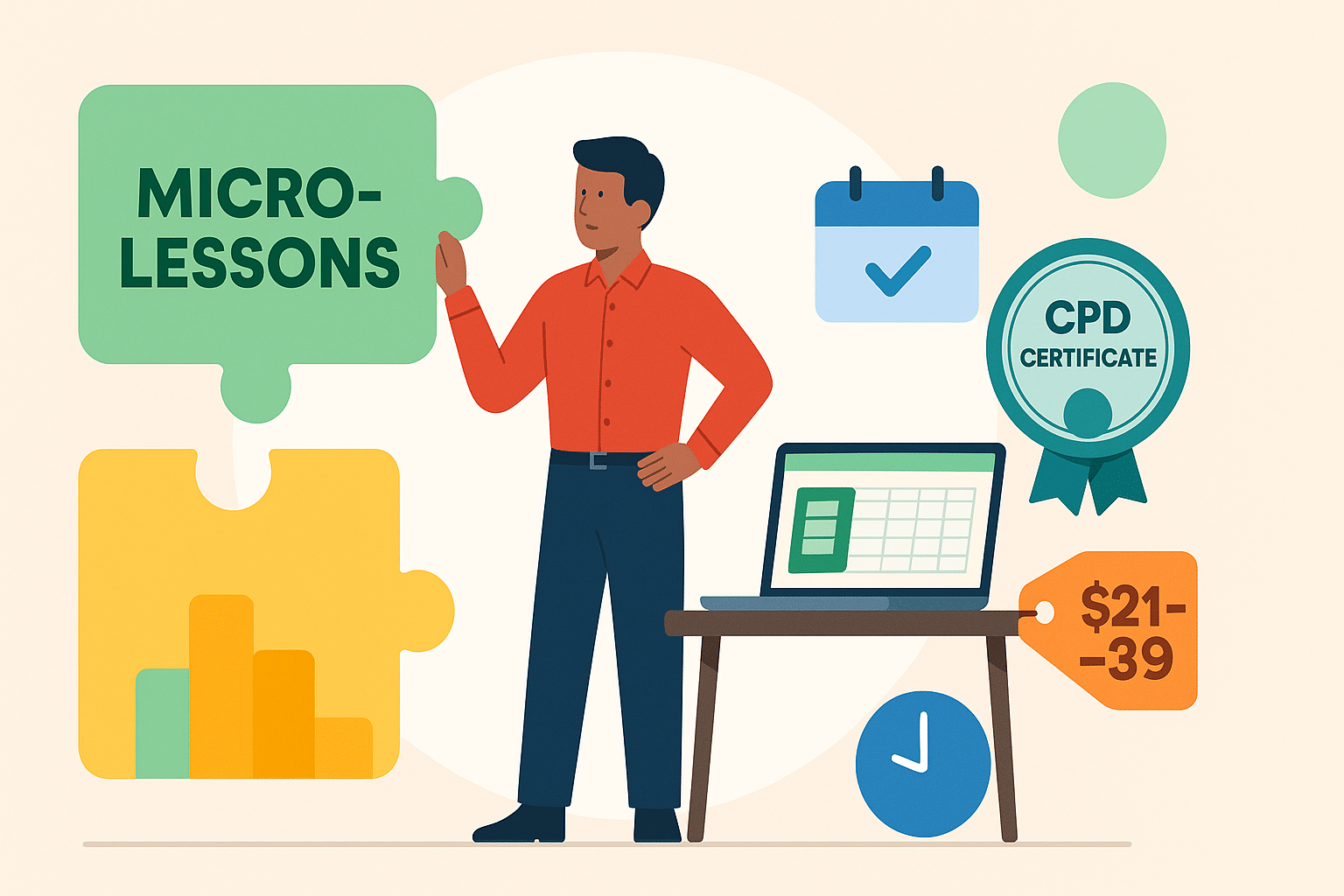
GoSkills Excel Course offers 61 micro-lessons that together amount to about 5 hours 46 minutes of content. The lessons are bite-sized and modular, so you can learn in short intervals rather than long stretches. On finishing, you get a CPD-accredited certificate that does not expire. Pricing is about $39 per month. This is ideal for professionals who prefer learning in small chunks and need flexibility to learn across busy schedules.
Coursera “Excel Skills for Business” Specialization
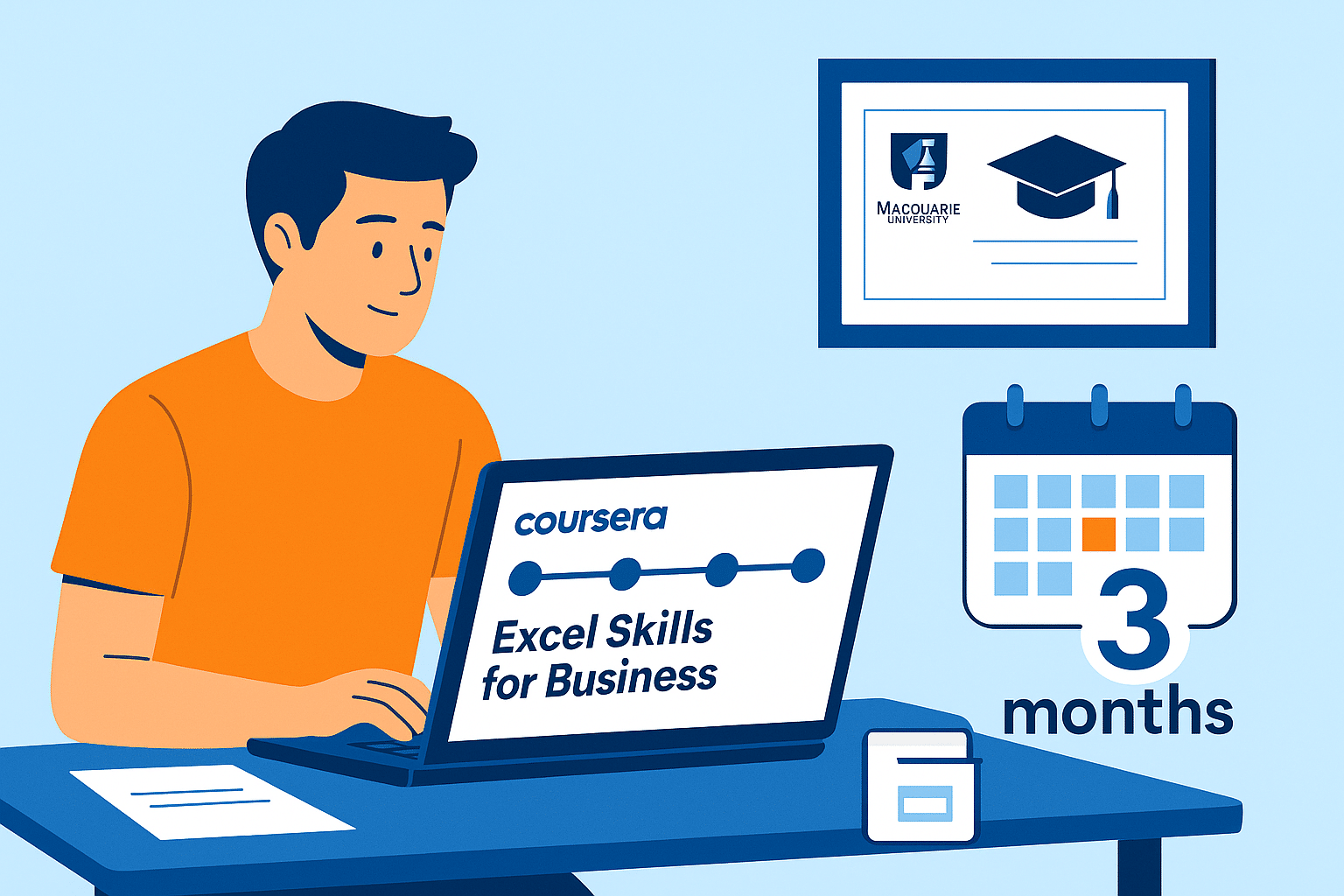
This is a four-course track designed to be completed over about 3 months, assuming you spend around 10 hours per week studying. It combines structured lessons with projects and exercises to build from foundational to advanced skills. Upon completion, you receive a university-issued certificate (Macquarie University), which does not expire. The cost is about $49 per month. This option appeals to learners who prefer academic rigor, guided coursework, and a certificate with institutional backing.
Udemy “Excel: Beginner to Advanced” Course
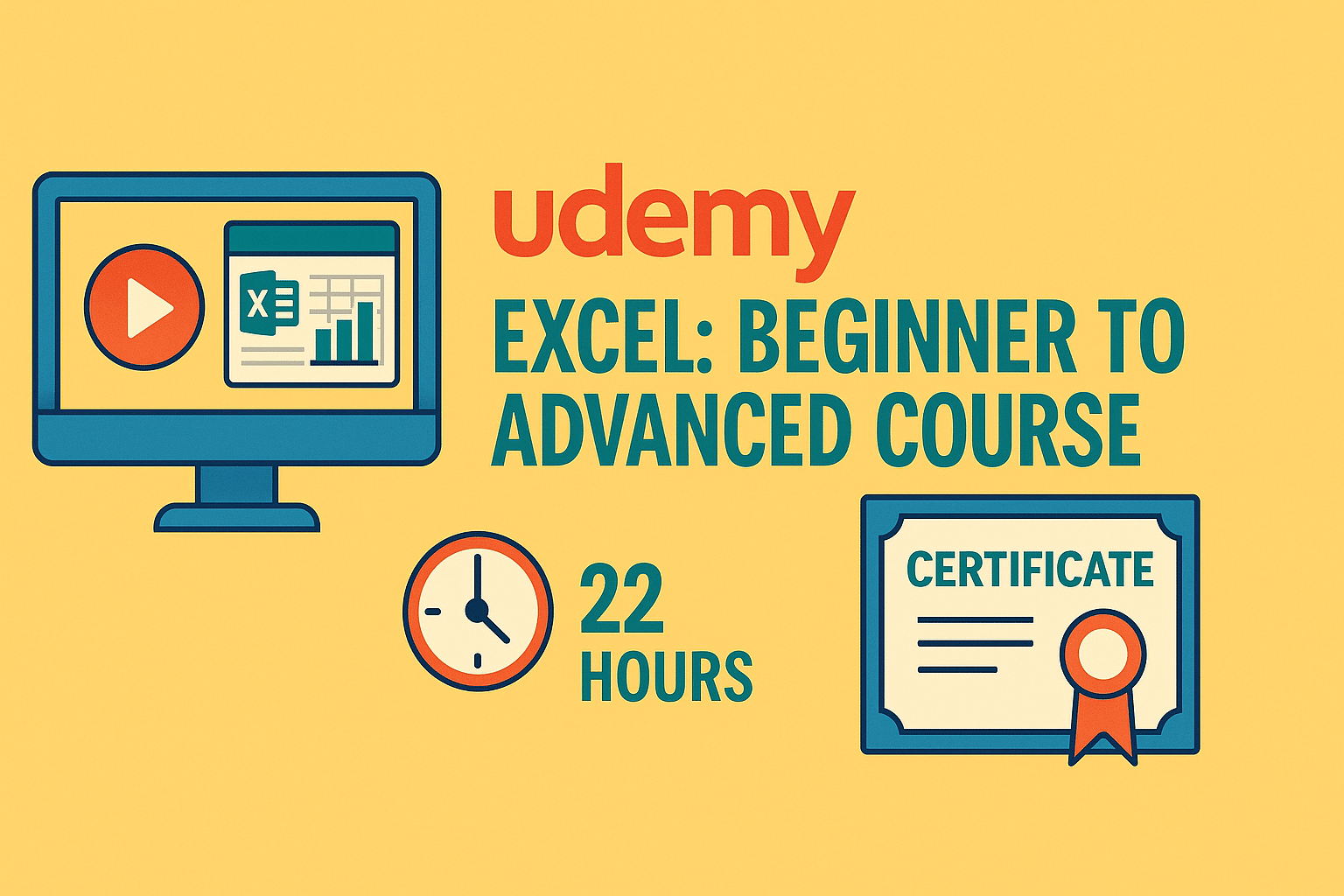
This course offers around 22 hours of on-demand video content covering both basic and advanced Excel topics including advanced Excel Formulas. After you finish, you get a PDF certificate (with no expiry). The big draw is the one-time cost, which often ranges between $15–$20 USD when on sale. You gain lifetime access to the course materials. This path is well suited for self-paced learners who want value and flexibility without ongoing subscription fees.
LinkedIn Learning “Excel Essential Training”

A relatively short course comprising about 3 hours 40 minutes of video instruction, this offering is built for quick refreshers and essential Excel topics. Upon completion, you receive a LinkedIn certificate which can be added to your profile automatically. The typical cost is $29.99 per month, though many public libraries or institutions provide free access as part of their benefits. This course is perfect if you want a compact, credentialed boost to your résumé or need to brush up on core Excel skills.
How to choose the right path
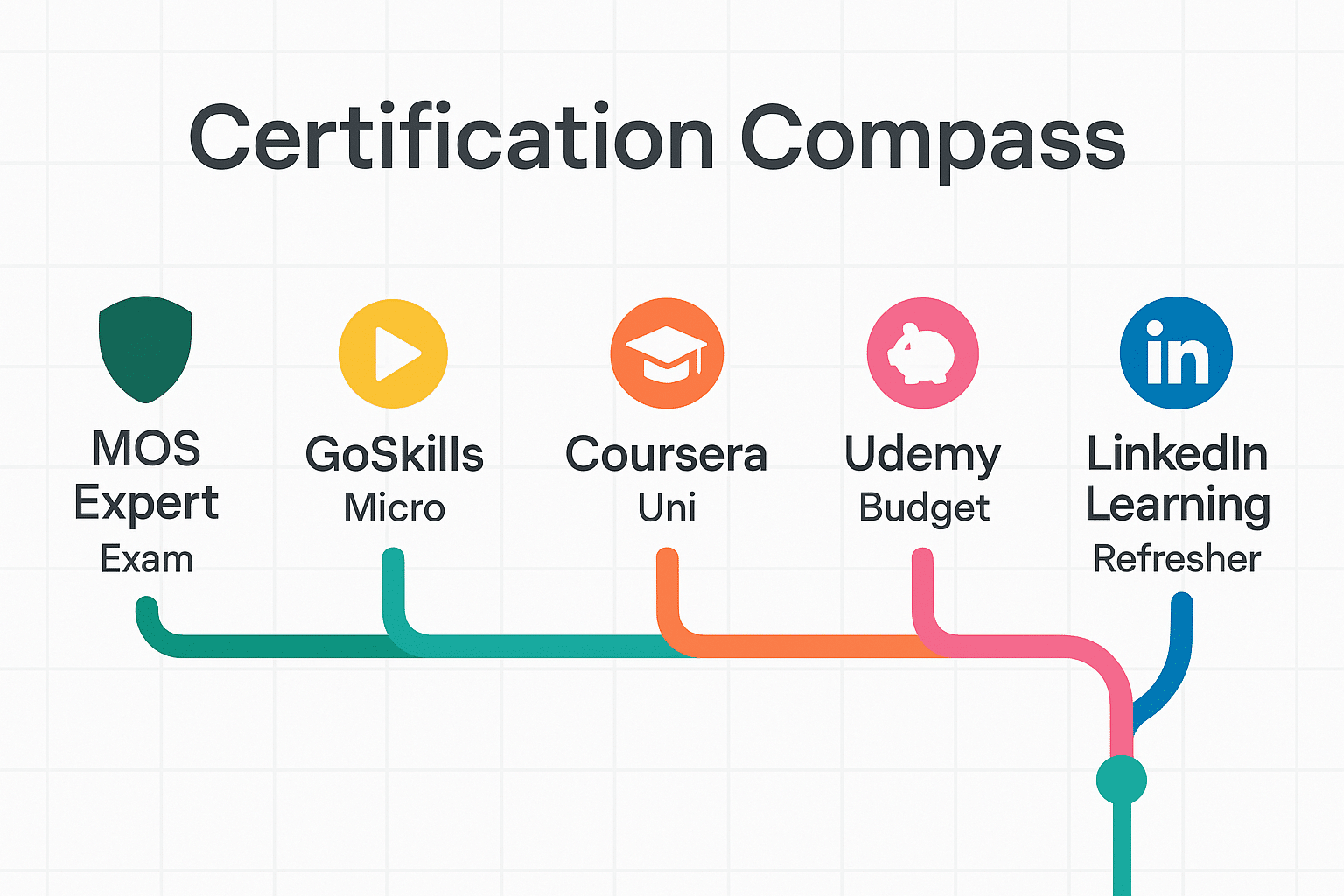
Your ideal credential depends on four levers: role requirements, current skill depth, calendar bandwidth, and learning style.
- Check job ads first. If postings for your target role say “MOS Excel Expert preferred,” the Microsoft badge clears the résumé filter fast. A 2025 LinkedIn study found that 38 percent of analyst listings mentioned the MOS credential—double the 2022 share.
- Audit your skills honestly. Can you build a PivotTable from scratch and fix a broken VLOOKUP without searching? If yes, download a practice exam and book MO-211. If not, start with a structured course, then certify.
- Match study load to your calendar.
- ≈ 10 h/week for 3 months: Coursera specialization
- ≈ 5 h 46 m total in five-minute chunks: GoSkills
- 22 h on-demand playlist: Udemy weekend sprint
- 3 h 40 m refresher: LinkedIn Learning
- 50-min exam after prep: MOS Expert
- Align with your learning style.
- Thrive under pressure: proctored exam
- Prefer instructor demos and peer forums: Coursera
- Need micro-lessons between meetings: GoSkills
- Self-starter on a tight budget: Udemy
Still unsure? Complete a skills-heavy course, then sit MO-211 while the material is fresh. The two credentials give you both a project portfolio and a vendor-verified badge, providing double proof in one study cycle.
Conclusion
Excel remains the lingua franca of data work, and the right certification can prove your expertise to hiring managers in 2025. Match your learning style and career goals to the options above, then invest in the credential that delivers the greatest return on your study time.
Frequently asked questions
Is the MOS Excel Expert exam hard?
Yes, because it is entirely practical. Microsoft allows 50 minutes and expects about 150 hours of practice before test day. If you can build PivotTables, nest XLOOKUPs, and record a simple macro without help files, you’re ready. Otherwise, plan a few weekends of targeted drills.
Do MOS certificates really expire after five years?
Certificates issued on or after September 2, 2025 expire five years from the award date. Credentials earned earlier remain lifetime.
Will employers accept an online-course certificate instead of MOS?
Many do, especially if the course is university-backed and you can demo a project. Large finance and government teams still screen for the Microsoft badge. When in doubt, list both the course for learning and MOS for verification.
Can I get certified for free?
Learning can be free. LinkedIn Learning via public libraries and Coursera audits cost $0. The MOS exam voucher runs $104, but 43 percent of U.S. employers reimburse certification fees, according to CompTIA’s 2025 Workplace Study.
Should I study first or book the exam now?
Study first unless you already automate reports daily. Take a timed practice test; if you hit 80 percent with five minutes to spare, schedule MO-211. Otherwise, complete a skills-heavy course, then retake the practice test before booking.
